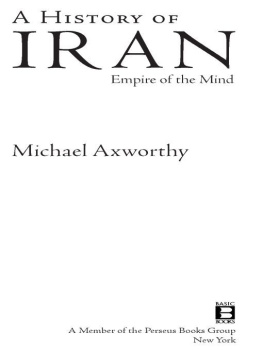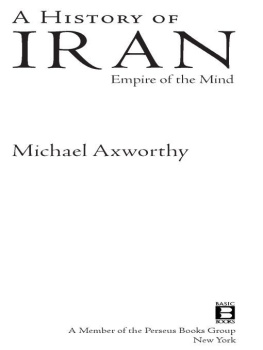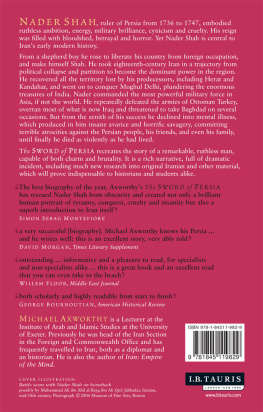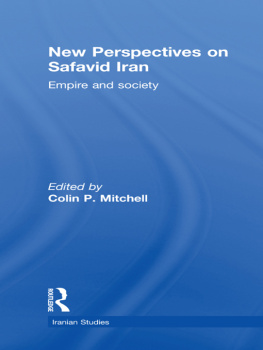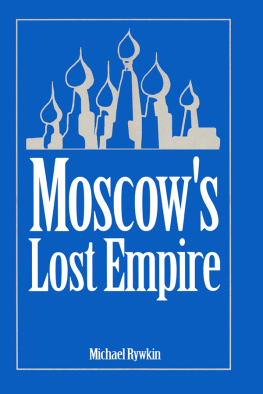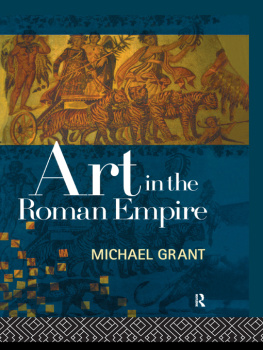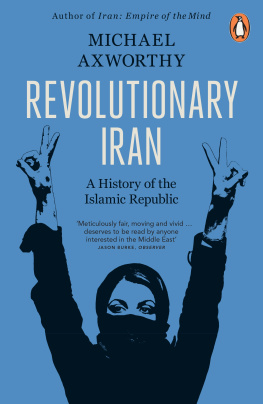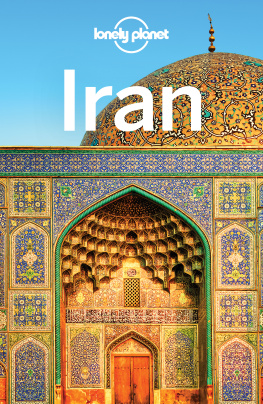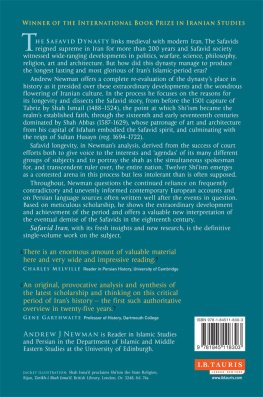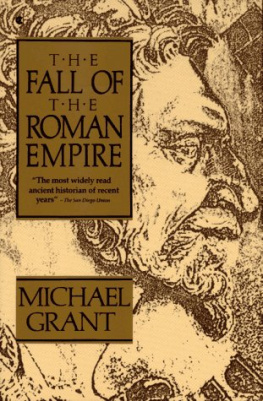Table of Contents
PRAISE FOR
A History of Iran
[A] beautiful distilled retelling of Iranian history that flashes with insight on every page. A writer and lecturer on contemporary Iran who formerly headed the Iran desk at the Foreign Office, [Axworthy] begins at the beginning and tells a very good story.
Financial Times
[ A History of Iran ] does provide a wonderfully engaging and informative introduction to Iranian history. This work celebrates the vital importance of storytelling for Iranians in teaching about their own history and culture, upon which it sheds so much useful light.
Middle East Journal
In A History of Iran , Michael Axworthy, a lecturer in Arabic and Islamic Studies at the University of Exeter, UK, provides a clear, swift-moving narrative, detailed but not cluttered, that takes the reader briskly down the highway (and more significant byways) of two and a half millennia of Persian history.... It is hard to imagine a better treatment of Persia within a single volume than this.
Foreword
A fine discussion of Iranian progress and a top pick for any library strong in Middle Eastern studies.
Midwest Book Review
[Axworthys] work provides considerable insight into how the country got where it is today and useful context for understanding the sometimes alarming comments of its current leaders. On that basis alone, Empire of the Mind is well worth reading for anyone whos interested in Middle Eastern affairs and their impact on the rest of the world.
Charleston Post & Courier
Michael Axworthy is a lover of things Persian: their history as one of the oldest continuing civilizations in the world, their poetry, their modern cinema and so on. Axworthy, in his book, A History of Iran , understands Iran as both an empire of the mind (a deeper, humane, reflective Iran) and a revolutionary Islamic empire with a heightened sense of its own uniqueness.
Jewish Herald Voice
Inviting us to look beyond the menacing bluster of the Iranian president, Mahmoud Ahmadinejad, Axworthy celebrates Irans rich history of tolerance and creative expression.
The Chronicle of Higher Education , 1949,
[Axworthy] has written a compact but still inclusive narrative account that conveys both the diversity and richness of the various empires and cultural forces that have shaped the Iranian people.... This is an excellent examination of the forging of a people who are poised to, once again, play a prominent role in world affairs.
Booklist
Michael Axworthy has crafted a concise history of a country that has captured the imagination of the world for several millennia.
The Roanoke Times
Exceptionally lucid, intriguing and informative.... Without rose-glasses or narrowed eyes, without being an apologist or a zealot opponent, Axworthy presents a history by turns thrilling, cautionary, inspiring and surprising.
Scotland on Sunday (UK)
At this time above all, we need a deeply informed, engagingly written history of the nation from Cyrus to Khomeini and beyond. Axworthy does the job with balance and aplomb. Readers who fear that they may shrink in confusion will warm to his human-scale portrait of a self-renewing culture that, as with its world-beating cinema today, shows enduring greatness and creative power.
Belfast Telegraph
TO MY WIFE SALLY
Das Ewig-Weibliche zieht uns hinan
... However, when I began to consider the reasons for these opinions, all these reasons given for the magnificence of human nature failed to convince me: that man is the intermediary between creatures, close to the gods, master of all the lower creatures, with the sharpness of his senses, the acuity of his reason, and the brilliance of his intelligence, the interpreter of nature, the nodal point between eternity and time, and, as the Persians say, the intimate bond or marriage song of the world, just a little lower than angels, as David tells us. I concede these are magnificent reasons, but they do not seem to go to the heart of the matter....
... Euanthes the Persian... writes that man has no inborn, proper form, but that many things that humans resemble are outside and foreign to them: Man is multitudinous, varied, and ever changing. Why do I emphasize this? Considering that we are born with this condition, that is, that we can become whatever we choose to become, we need to understand that we must take earnest care about this, so that it will never be said to our disadvantage that we were born to a privileged position but failed to realize it and became animals and senseless beasts.... Above all, we should not make that freedom of choice God gave us into something harmful, for it was intended to be to our advantage. Let a holy ambition enter into our souls; let us not be content with mediocrity, but rather strive after the highest and expend all our strength in achieving it.
Pico della Mirandola, Oration on the Dignity of Man
(translated by Richard Hooker)
Preface
The Remarkable Resilience of the Idea of Iran
Har kas ke bedanad va bedanad ke bedanad
Asb-e kherad az gombad-e gardun bejahanad
Har kas ke nadanad va bedanad ke nadanad
Langan kharak-e khish be manzel beresanad
Har kas ke nadanad va nadanad ke nadanad
Dar jahl-e morakkab abad od-dahr bemanad
Anyone who knows, and knows that he knows,
Makes the steed of intelligence leap over the vault of heaven.
Anyone who does not know, but knows that he does not know,
Can bring his lame little donkey to the destination nonetheless.
Anyone who does not know, and does not know that he does not know
Is stuck for ever in double ignorance
(Anonymous, attributed to Naser od-Din Tusi (1201-1274);
anticipating Donald Rumsfeld by perhaps seven centuries)
Iranian history is full of violence and dramainvasions, conquerors, battles, and revolutions. Because Iran has a longer history than most countries, and is bigger than many, there is more of this drama. But there is more to Iranian history than that. There are religions, influences, intellectual movements, and ideas that have changed things within Iran, but also outside Iran and around the world. Today Iran demands attention again, and the new situation poses questions: Is Iran an aggressive power, or a victim? Is Iran traditionally expansionist, or traditionally passive and defensive? Is the Shiism of Iran quietist, or violent and revolutionary? Only history can suggest answers to those questions. Iran is one of the worlds oldest civilizations, and has been among the worlds most thoughtful and complex civilizations from the very beginning. There are aspects of Iranian civilization that, in one way or another, have touched almost every human being on the planet. But the story of how that happened, and the full significance of those influences, is often unknown and forgotten.
Iran is replete with paradoxes, contradictions, and exceptions. Most non-Iranians think of it as a country of hot deserts, but it is ringed with high, cold mountains. It has rich agricultural provinces, and others full of lush subtropical forests. Reflecting its wide climatic variations, Iran has a diverse and colorful range of flora and fauna. Between Iraq and Afghanistan, Russia and the Persian Gulf, Iranians speak an Indo-European language in the midst of the Arabic-speaking Middle East. Iran is commonly thought of as a homogeneous nation, with a strong national culture, but minorities like the Azeris, Kurds, Gilakis, Baluchis, and Turkmen make up nearly half the population. Since the 1979 revolution, Iranian women have been subject to one of the most restrictive dress codes in the Islamic world, yet partly in consequence, Iranian families have released their daughters to study and work in unprecedented numbers. More than sixty percent of students entering university now are female, and many womeneven married womenhave professional jobs.


